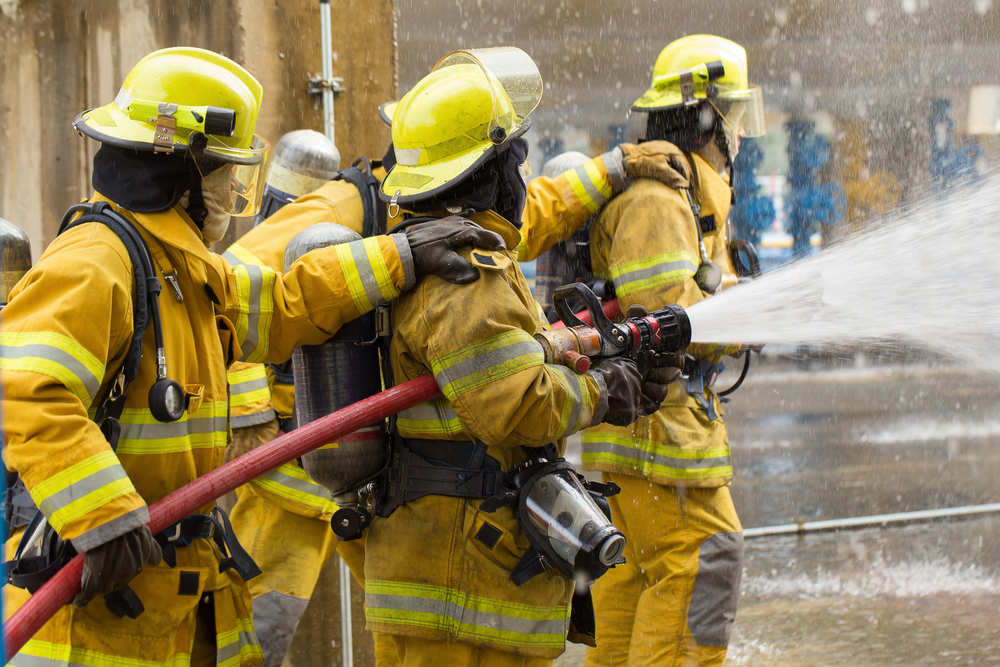English firefighting apprentices share their experience for National Apprenticeship Week
- February 6, 2023
- 8:45 am


Iain Hoey
Share this content
To coincide with the 16th annual National Apprenticeship Week (6-12 February), apprenticeships experts SFJ Awards spoke to firefighting apprentices across the country to find out more about their experiences of starting a career in fire and rescue.
Ellice Schnable (ES), Jolanta Paledzka (JP) and Chloé Cassar (CC) of London Fire Brigade, Jordan Ahmed (JA) of Hereford and Worcester Fire and Rescue Service, Charlie Thomas (CT) and Lauren Bradshaw (LB) of Cheshire Fire and Rescue Service, and Helen Pettersson (HP) of Dorset and Wiltshire Fire and Rescue Service give their views.
How did you start your apprenticeship?
CC: My dad’s business had a fire that completely destroyed everything, it was witnessing the calmness of the firefighters at the incident that made me want to do what they do. I turned a really tragic event into a part of my story to my ‘why’ and it was the best thing I’ve ever done.
LB: Prior to starting my apprenticeship I worked as an animal rescue officer for the RSPCA helping to rescue sick and injured animals. I really enjoyed the ‘hands on’ side of the job and having worked alongside the fire service on some rescues and seeing what they did, I started to look into careers within the fire service. I saw on social media that Cheshire Fire and Rescue Service were recruiting for community safety and firefighter apprentices. This really appealed to me as it would give me the opportunity to work within different areas of the service before proceeding onto the firefighter role which would give me a better insight to the organisation overall.
What has been the best part of your apprenticeship journey?
ES: The best part throughout the apprenticeship is making some really close friends with my squad which I had while at training school. Nearly 2 years down the line we all keep contact even though we are all at different stations.
HP: The support and encouragement of my watch, my station managers and the college – they were with me every step of the way and I couldn’t have done it without them.
LB: The best part for me has been getting out in the community and educating people to be safer in their homes. The prevention work that we do is so important as this contributes towards allowing people to live their lives safely. I also get to meet many different people from all walks of life which is great.
CC: Learning so much and enjoying every part of it! Not being bored by any element and eager to learn more. I made the best friends whilst in training and made some amazing memories that I won’t forget.
Apprentices in England must pass an End-Point Assessment (EPA) before formally completing their apprenticeship journey. The EPA tests the knowledge, skills and behaviours that an apprentice has gained during their training. How did you prepare for your EPA and what was your experience of it?
HP: In preparation I completed a mock assessment, which was great for asking any questions that I had prior to the assessment. The assessment itself was a question/answer style format on the topics I had been working on throughout the apprenticeship. The assessor was very friendly and reassuring and helped me to feel relaxed so that my exam nerves didn’t get in the way of my exam performance.
JA: I spent lots of time with my head in books and taking time to work on the practical elements of the assessment too. Repetition works well for me, so repeating the information in my head and working on the practical skills required helped to make sure I learnt it and that it stayed with me.
JP: I’ve been working with my crew in the drill yard for the practical part of the assessment. Listening to feedback from the crew and paying attention to detail was essential. For the written and verbal part of the assessment I’ve been using my own notes and having one-to-one conversations with colleagues to practice my answers.
What tips do you have for those interested in embarking on an apprenticeship in fire and rescue?
ES: Always stay focused, and put 100% in, whether it be studying or practicing nonstop to achieve. Also, just have fun and enjoy every minute of it!
CT: Don’t give up! Firefighter apprenticeships are competitive, and fire and rescue services receive a lot of applications every year. Apprenticeships are for people from any background and at any age, so don’t let stereotypes hold you back. Take time to write your application and use examples from a range of scenarios and experiences, as bringing these to the table will help you and your team if successful. One thing is for sure, if you put the effort in and go the extra mile, it will not go unnoticed and you will have a very respectable and rewarding career to look forward to, with the apprenticeship giving the perfect grounding for just that.
LB: Go for it! I was a little sceptical about applying at the start as I was under the impression that apprenticeships were for people coming out of school. I was 36 years old when I applied, and it has turned out to be the best decision I’ve made. My advice to you would be don’t let your age be a barrier for something you want to do, age is just a number.
SFJ Awards is the End-Point Assessment Organisation of choice for the protective services, with industry leading-expertise in fire and rescue. Follow SFJ Awards on Twitter and LinkedIn for more live insights into the apprenticeships that we support during National Apprenticeship Week 2023 #NAW2023.



